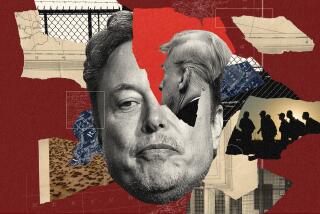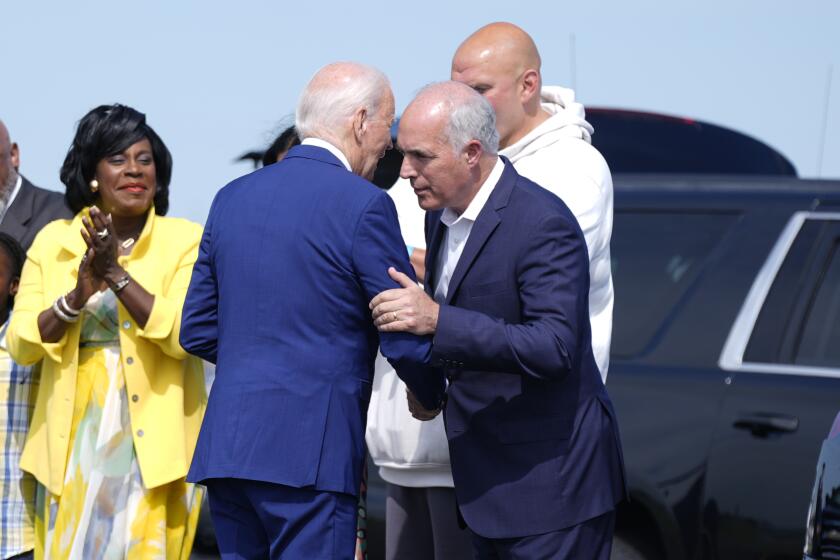A convention without corporate sponsors?
CHARLOTTE, N.C. — When Democratic Party leaders began planning the 2012 national convention, they vowed to put it on without the help of corporations, lobbyists and political action committees who have traditionally helped finance the multiday extravaganzas, relying instead on small donations to pay for a “people’s convention.”
But corporate money maintained a persistent presence here this week.
“Thank you to all of our corporate sponsors,” read a large white banner at the CarolinaFest street fair that kicked off the convention.
PHOTOS: 2012 Democratic National Convention
It listed 16 companies, including AT&T;, Bank of America, Coca-Cola and UnitedHealth Group; they were among those who together gave at least $11 million to a nonprofit organization called New American City set up by convention organizers to handle the street festival, media welcome party and delegate receptions.
Unlike a separate committee that aimed to raise $37 million for the production of the convention itself, New American City was allowed to accept direct corporate, PAC and lobbyist money.
“We told the [host] committee, from the beginning, that we wanted to participate in any way that we could,” said Peter Covington, vice chairman of the global law and lobbying firm McGuire Woods, which sponsored both CarolinaFest and a kickoff party for the media held at a sprawling music venue.
“We really did step up to make sure that Charlotte showed well,” he said. “It was our commitment to making it succeed, without regard to the political part.”
The convention committee itself also had corporate backing. Although the companies could not give directly to it, they could make in-kind contributions — Xerox, for example, gave printing and supplies worth $150,000, according to the Charlotte Observer.
Democratic officials insisted they met their self-imposed standard of financing the convention without the help of special interests, arguing that the activities put on by New American City were separate from the convention itself.
“Even though it was quite challenging — it made it more challenging to meet our budgetary needs and took a little bit longer than any of us were comfortable with — we are so proud that we made sure that this was the most open and accessible and inclusive community-oriented convention in history,” Democratic National Committee chairwoman Debbie Wasserman Schultz said as delegates buzzed around her in the Charlotte Convention Center on Wednesday. “People know this is a convention they own, that they have a piece of this campaign.”
Political parties are banned from accepting corporate money for their quadrennial gatherings, a Watergate-era reform instituted after a scandal surrounding the 1972 Republican convention, when the International Telephone and Telegraph Corp. offered $400,000 to help bring the event to San Diego at the same time the company was trying to get the Nixon administration to drop antitrust charges.
Since 1976, the two major parties have received public funds to put on the events — this year, $17.7 million each.
But neither sticks to that budget, thanks to a loophole created by the Federal Election Commission in 1977, when it decided that the conventions could be produced in part through unlimited donations to a local host committee.
That’s brought in a gusher of cash for increasingly lavish events. Four years ago, organizations such as corporations and unions gave 86% of the $61 million Democrats raised for their convention in Denver.
“We have gone entirely full circle,” said Craig Holman, legislative representative for the campaign-finance watchdog group Public Citizen.
Holman credited Democratic convention organizers for their “noble efforts” this year, but said new legislation was required to truly keep special interests at bay.
Charlotte leaders did not know about the rules when the city was chosen to host the event. Host committee co-chair Jim Rogers, chief executive of Duke Energy, had already secured commitments of around $11 million from locally based companies to help pay for the convention before the party announced that corporate, lobbyist and PAC money would not be accepted, said Rogers spokesman Tom Williams.
Those companies donated instead to New American City, along with other corporations later recruited by Rogers.
“He certainly built on that $10 to $11 million, certainly brought in more from other companies nationwide,” Williams said. Rogers also worked to secure donations from individuals, who could give up to $100,000 to the convention committee.
“He put a lot of time into it,” Williams said. “It’s a different way to do it.”
The rules may have made it more challenging, but they did not keep major corporations from participating. Among the donors to New American City listed on sponsor signs were Time Warner Cable, U.S. Airways and Wells Fargo.
“As part of our civic leadership and consistent with prior presidential election years, we supported the host committee in Tampa and also joined other companies headquartered in Charlotte to do our part to help make the city successful,” said Scott Silvestri, spokesman for Bank of America, which gave an undisclosed sum.
The political action committee of the public relations giant Hill & Knowlton — whose U.S. operations are headed by former Bush White House advisor Dan Bartlett — gave $18,000 to both New American City and the Tampa Bay host committee, as the Charlotte Observer first reported.
And Charlotte business executives were some of the biggest boosters of the event.
“Here, you have a national platform for people to see Charlotte, to see it’s not a provincial city, but a thriving, diverse city,” said Jeffrey Merrifield, a senior vice president at Shaw, an energy, chemicals and infrastructure company that gave to New American City and also helped host a bash for the North and South Carolina delegations at the NASCAR Hall of Fame.
The convention also put a spotlight on local industries, he noted.
“We are a part of a major effort here to demonstrate that Charlotte has become a real energy hub for the United States,” Merrifield said. “We wanted a platform for people to understand that.”
Gold reported from Charlotte, N.C., and Mason from Washington.
More to Read
Get the L.A. Times Politics newsletter
Deeply reported insights into legislation, politics and policy from Sacramento, Washington and beyond. In your inbox three times per week.
You may occasionally receive promotional content from the Los Angeles Times.











